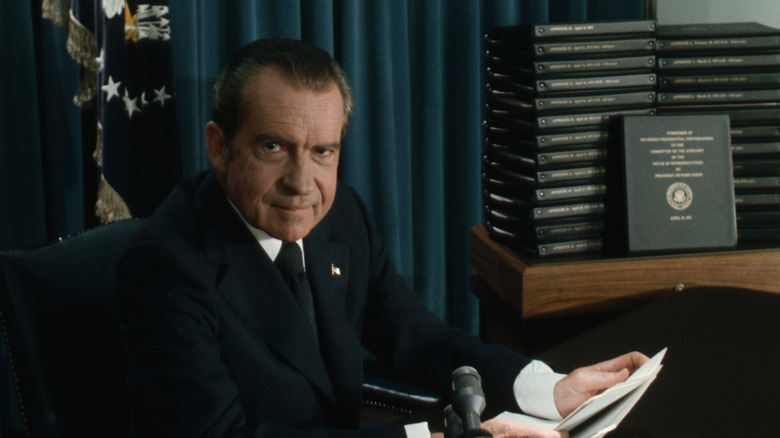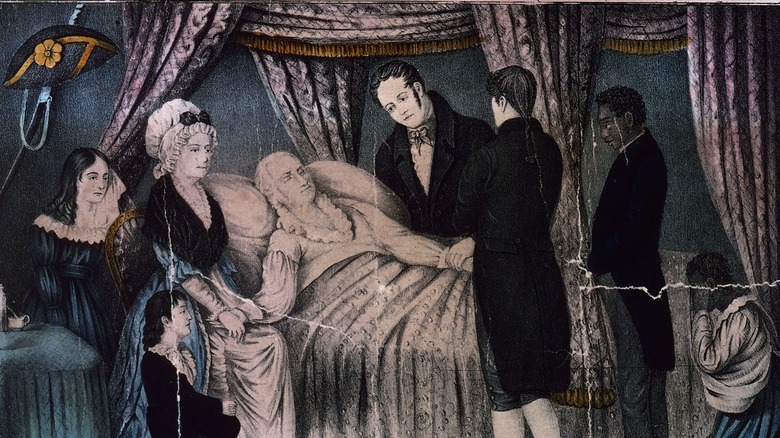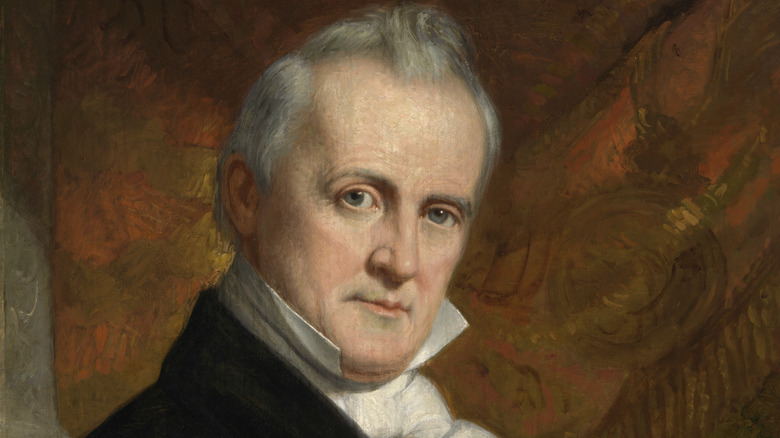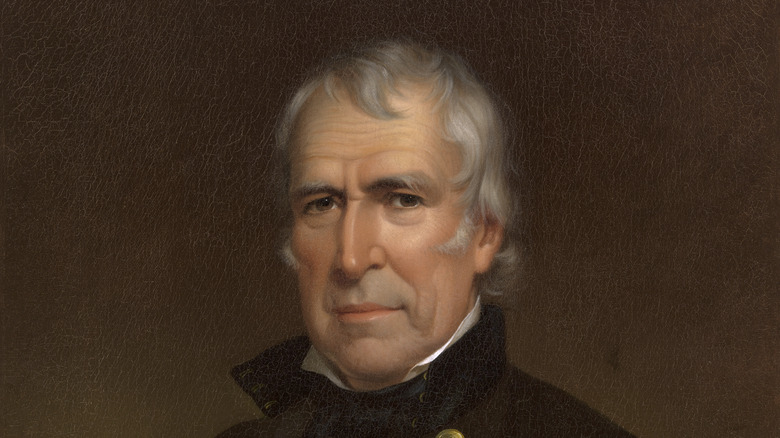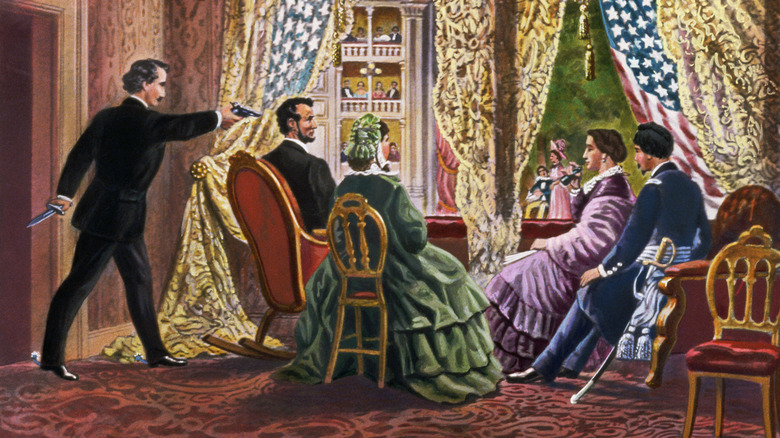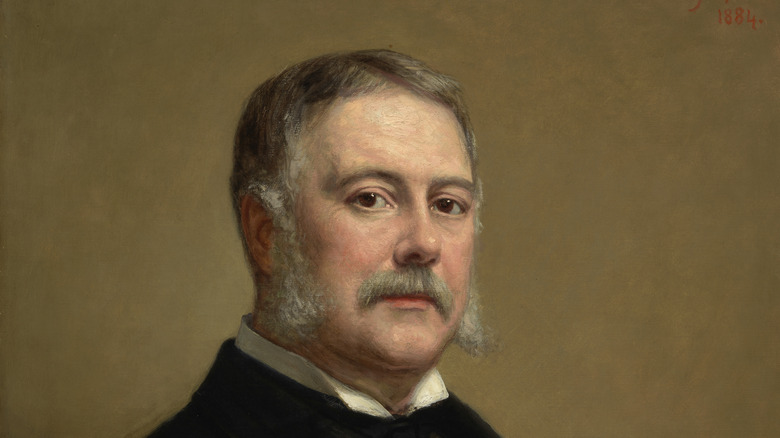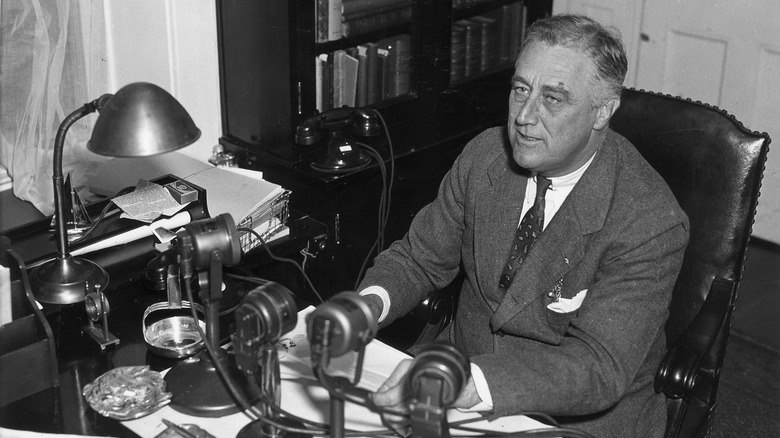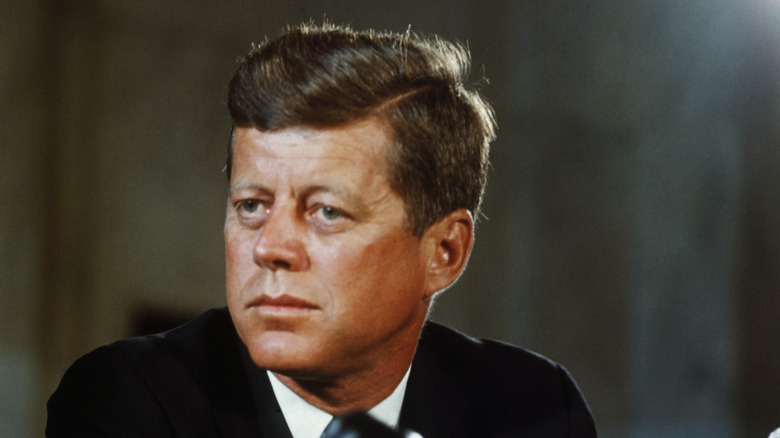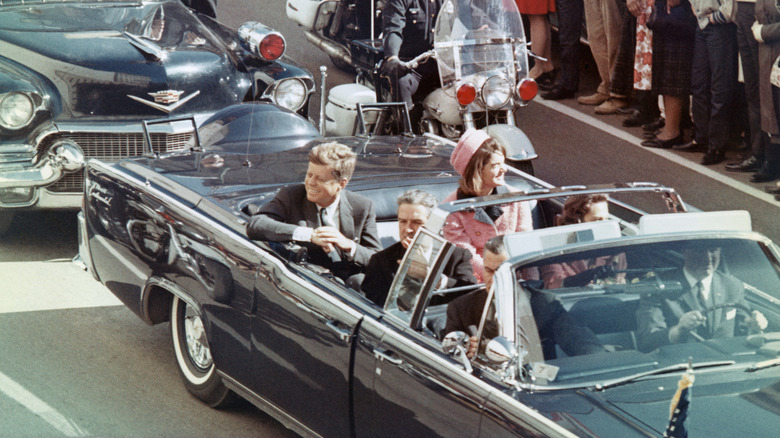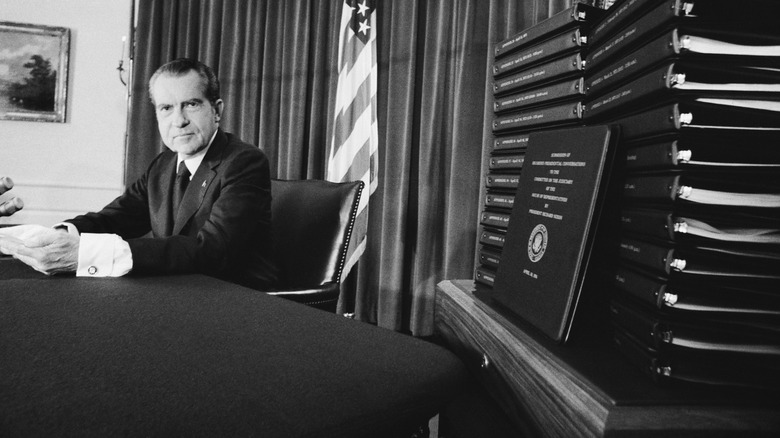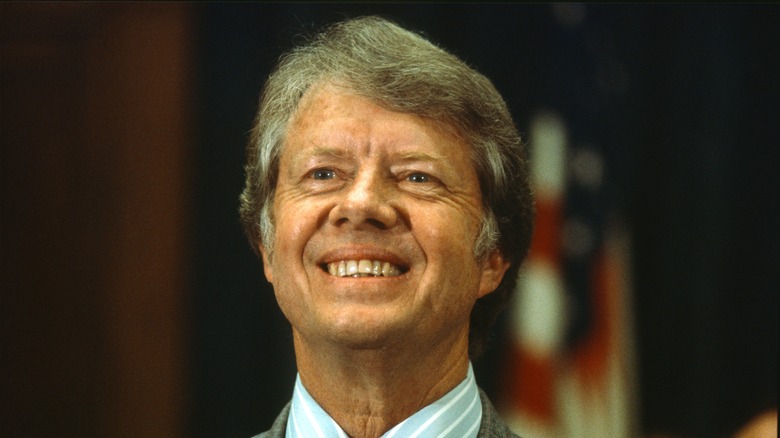Mysteries About U.S. Presidents That Are Still Unsolved
For many presidents, it may quickly start to seem as if they are living in a fishbowl where every word, movement, and hesitation is recorded for posterity and scrutiny. It's not really surprising. Each one is, in their turn, the leader of a major world power, after all, and so it makes sense that they are nowadays followed by an ever-shifting and always-watching group of staff members, legislators, reporters, members of the public, and more.
Yet, for all of the near-constant attention that has followed the U.S. president practically since George Washington first took office on April 30, 1789, not everything about the commander in chief is so clear. Dig into the history of the presidency, and you'll find quite a few mysteries that remain despite sometimes decades or even generations of investigation. Multiple presidents have died in confusing ways, for instance, while one may not have strictly been a U.S. citizen to begin with (and, no, despite it being one of Donald Trump's favored conspiracy theories, that's not Barack Obama, who is definitely a native-born U.S. citizen).
Even relatively modern presidents have tricky details to their stories, as a few pointed questions about Nixon and the Watergate scandal can make all too clear. These and more are some of the lingering unsolved mysteries about U.S. presidents.
What exactly killed George Washington?
What killed George Washington? The basic story maintains that the first-ever U.S. president tragically died on December 14, 1799 of a throat infection. Two days earlier, he had been out riding and was caught in freezing rain. When he returned home, the schedule-conscious Washington went straight to dinner in soaked clothes. A subsequent sore throat became increasingly worse until he was bed-ridden and finally died the evening of December 14.
But what kind of infection was so bad that it felled the man — and was it really what killed him? Washington's doctors couldn't agree on an explanation, pointing to throat abscesses or swelling obstructing airways as possible causes. Generations later, some have focused on strep throat, croup, pneumonia, diphtheria, and more, with little consensus. To many, it sounds an awful lot like a normal cold, which can be unpleasant but not necessarily fatal, even for a 67-year-old man at the very end of the 18th century.
What may well have been the killing blow were the four instances of bloodletting. Though it was a common treatment at the time and Washington himself favored the procedure, the doctors were perhaps overenthusiastic. All told, during his final illness, they drained a staggering amount of over 80 ounces of blood, or about 40% of his total blood volume. That surely did not help, but even with a wealth of eyewitness accounts of his treatment and final hours, we may never know the true cause of Washington's death.
Has there already been a gay president?
Though the advance of LGBTQ rights in the U.S. has many hoping for an openly gay president soon, there may have already been a gay commander in chief. The speculation centers on James Buchanan, who served as the 15th president of the United States from 1857 until 1861, and famously remains the only unmarried president. Prior to his term in the White House, Buchanan was a representative, diplomat, senator, and secretary of state for 11th president James K. Polk. While his mismanagement of the country likely helped kick off the American Civil War and earned him a reputation amongst historians as the worst U.S. president, Buchanan is also noted for his close friendship with William Rufus DeVane King.
While both served as senators in the 1830s, they not only agreed on their support for enslavement (again, Buchanan is hardly remembered well) but were markedly uninterested in marriage. They initially lived in communal quarters with single congressmen, but as others wed, that group dwindled to just Buchanan and King. Gossip about the capital eventually referred to the pair as "Mr. Buchanan and his wife" or "Aunt Nancy" and "Aunt Fancy."
Now, never being married proves little, while historians have noted that norms of male friendships have changed dramatically, meaning that emotionally close connections between 19th-century men were well-known and could remain platonic. Yet even people at the time noticed a particular closeness between Buchanan and King that merited remark and it still leaves many wondering.
How did Zachary Taylor die?
Poor Zachary Taylor. Today, he does little more than pop up in the litany of U.S. presidents recited by bored high schoolers. Although he was a war hero and the 12th president, Taylor barely made over a year into his term before dying in July 1850. During his brief presidency, he proved a strong opponent of southern secession, which was already being muttered about — or sometimes outright shouted — by pro-enslavement southerners (Taylor's own son Richard would become a Confederate general). Shortly after a public appearance on July 4, Taylor grew ill and, in less than a week, became one of the few people to die in the White House.
At the time, doctors blamed cholera morbus (an old-fashioned term for gastroenteritis) as the cause of Taylor's demise. Yet, given Taylor's fraught relationship with southern representatives, some have since wondered if there was more to his sudden end than a poor meal choice. After all, hadn't Taylor seemed hale and hearty right before his last full meal? Perhaps he had been poisoned with a common material of the era: arsenic.
That was the theory proposed by writer Clara Rising, who presented a compelling-enough case to Taylor's descendants that they agreed to have his remains exhumed and studied in 1991. Yet samples sent off to the Oak Ridge National Laboratory showed that Taylor didn't have any more arsenic in him than the average American of that era, though some maintain that his death remains mysterious.
Was Lincoln really the subject of a Confederate conspiracy?
The current narrative of the 1865 Lincoln assassination was that it was carried out by John Wilkes Booth, working in concert with a small group of sympathizers independent of the failing Confederacy. But could such an audacious plot have really been coordinated by a semi-famous actor and his criminal pals? To some, it seems too complicated for Booth to act alone.
James O. Hall, an amateur historian who was widely recognized as an expert on the Lincoln assassination, told The Atlanta Journal-Constitution that he and a group of co-authors believed that Booth was actually a Confederate agent who was cut off from communication with his superiors in the chaotic final days of the Civil War. In this scenario, Booth then acted in what he thought was his breakaway government's best interest and killed Lincoln. Perhaps, as some say, he was also killed by the Confederacy to keep things quiet as Reconstruction began.
Was Booth really a Confederate agent? The evidence is admittedly murky. His sister, Asia, wrote in her memoir that her brother often stayed at her house, where "Strange men called at late hours, some whose voices I knew, but who would not answer to their names; and others who were perfectly strange to me." Other accounts say he received unexplained payments and may have met with high-ranking officials, yet that's largely hearsay. If there was a wider Confederate conspiracy to kidnap or kill Lincoln, it remains hidden generations later.
Was Chester Arthur actually Canadian?
Today, one of the requirements to become president is to be born in the U.S. As dictated in Article II, Section 1, Clause 5 of the U.S. Constitution, only those who were citizens at the time the Constitution was adopted or who were born within the new nation thereafter could become president. Some quasi-exceptions have been made for children born abroad whose parents are American citizens, such as presidential candidate and Arizona senator John McCain, who was born in the U.S.-controlled Panama Canal Zone.
Chester A. Arthur may have hoped you wouldn't ask about this natural-born citizen clause. As some have alleged, Arthur was actually a Canadian citizen who was born just over the border in Quebec. The confusion stems in part from the fact that his parents (father William was originally from County Antrim, Ireland, while mother Malvina was a British subject from New Hampshire) moved back and forth across the border with Vermont.
The constant moves, paired with the fact that they had six children and birth records were inconsistent — including some that burned in a fire — makes Arthur's true citizenship cloudy. When he was asked to produce documents proving his U.S. birth, he reportedly took a semi-secret trip to Montreal to confirm that there were no records of a Canadian birth. Even today, some allege that Arthur actually assumed that identity of a long-deceased brother to cover his tracks. Of course, Arthur never clarified things, and so we're left in the dark.
What really killed FDR?
On April 12, 1945, Franklin D. Roosevelt became one of the few presidents to die in office. The official explanation was that Roosevelt had suddenly died of a cerebral hemorrhage at his retreat in Warm Springs, Georgia. To the public, this was a sudden shock, but those in FDR's inner circle knew he was battling many health problems, including cardiovascular issues and bronchitis. The ongoing threat of World War II and the stresses of managing the nation's role in the conflict were hardly helping his health, either.
But was it really a cerebral hemorrhage that killed him? A 2006 paper published in Archives of Dermatology took note of a potentially odd lesion observed on the president's forehead, and which appeared to grow in prominence as he aged. The spot, just above his left eyebrow, does not appear in photos of a younger FDR. Physicians at the time appeared to have deemed the spot to be of little danger, but the paper authors suggested that its size, shape, and color would be of concern to a dermatologist today.
Others have taken this theory even further and claimed that FDR had melanoma that metastasized into advanced cancer, but his diagnosis was concealed in order for him to continue winning presidential elections Indeed, some point out that FDR's potentially troublesome forehead lesion appears to have been edited out of photographs in the 1940s. But without tissue samples or first-hand accounts to back up these claims, they will remain unproven.
Did JFK have an affair with a Soviet spy?
When it comes to reputations, JFK has one of the most colorful. He was one of the youngest elected presidents in the nation's history, taking office at age 43, and galvanized many voters with his charisma, economic reforms, and leadership role in the Cold War. However, he also had a darker side, which allegedly included multiple affairs with women who were definitely not his wife. Of course, Kennedy was hardly the first president to cheat on his spouse (DNA evidence strongly suggests Thomas Jefferson fathered children with enslaved woman Sally Hemings).
The mysterious bit centers on one JFK mistress: Ellen Rometsch. A fixture of the private Quorum Club in Washington, D.C., Rometsch was married to a West German army officer. Yet she reportedly wasn't too concerned with monogamy, engaging in trysts with the high-powered political types that visited the club. Eventually, that came to include Kennedy, who is said to have quite enjoyed Rometsch's attention.
But Rometsch's German connections were worrisome, with the FBI allegedly speculating that she might actually be a spy for communist East Germany. Given her rather close connection to the president, that could have been a major issue — so she was deported. Maybe. In 2013, Rometsch's then-husband told Welt that she was never a spy and Kennedy never gave her hush money. Moreover, FBI reports from the time concluded that an investigation into her didn't hold water. Then again, that's just what a spy cover-up would say.
Where is JFK's brain?
On November 22, 1963, JFK was fatally shot while riding in a motorcade in Dallas, Texas, leading almost immediately to national shock and mourning, as well as a bevy of conspiracy theories that grind on to this day. While the government investigation known as the Warren Commission found that Lee Harvey Oswald acted alone as the president's assassin, others simply haven't been able to let go of the idea that JFK's death was part of a larger conspiracy. Admittedly, there are some odd details about the assassination that have never been resolved, like the mysterious disappearance of JFK's brain.
Given that Kennedy was struck in the head, that brain could have been a key piece of evidence. After it was removed during the president's autopsy at Parkland Memorial Hospital, it was locked in a metal box, handed over to the Secret Service, and moved to the White House. Later, Senator Robert F. Kennedy (JFK's brother and his attorney general) had it moved to the National Archives.
Only, by 1966, there was no record of the brain in the National Archives. This inflamed conspiracy theorists even further, with some claiming that the organ had been secreted away to conceal evidence that Kennedy was hit by a bullet fired from a different direction. Others said it was to hide just how ill or medicated JFK may have been at that point. Others contend that it was simply the result of a mundane but consequential bureaucratic mix-up.
Nixon's missing tapes caused consternation
On August 8, 1974, President Richard Nixon delivered a televised resignation to the nation, making him the first U.S. president to resign his office. Though he maintained his general innocence, Nixon's administration was tainted by the Watergate scandal (which itself remains pretty mysterious), in which a group of people (some associated with Nixon) broke into the Democratic National Committee headquarters to wiretap the premises. Nixon had also wiretapped himself and his visitors beginning in February 1971, with tapes recording goings-on in the Oval Office, as well as Nixon's offices in the Executive Office Building and at Camp David. Nixon's reaction to Watergate (which included attempts to fire key opponents) and the mounting pressure from investigations contributed to his resignation.
Nixon was ordered to turn the tapes over to the Senate once officials learned of the wiretapping in July 1973. Ultimately, transcripts were released as well, but there remained a mysterious 18.5-minute gap in a 1972 recording. Nixon's secretary, Rose Mary Woods, claimed she accidentally erased the segment while she was producing the transcriptions.
The erasure supposedly happened after she reportedly taped over the recording with dictating equipment, but her explanation — that she held down a dictaphone foot pedal while answering the phone — would have required an extraordinary and improbable stretch across her desk. Some wonder if the loyal Woods intentionally erased the most incriminating parts of the Nixon tapes. Though attempts have been made to recover the missing minutes, they remain unsuccessful.
Did Jimmy Carter see an alien spacecraft?
Many presidential mysteries are pretty Earth-bound, but at least one might involve something truly out of this world. That depends on how you interpret a 1969 UFO sighting reported by Jimmy Carter. At the time, Carter was a district governor of the Lions Club service organization. While standing outside in Leary, Georgia, shortly after sunset, Carter and about 12 other Lions Club members spotted a swiftly moving light on the western horizon. Carter later said that it first appeared to be as large as the moon, but rapidly changed in size and shape over the course of about 10 minutes before disappearing.
Carter didn't actually report the incident until 1973, at which point he was the governor of Georgia. UFO investigators had sent him a form after hearing of his sighting; there, Carter wrote that he didn't believe the object was of extraterrestrial origin. Some have since claimed that Carter and friends actually saw the planet Venus, which can appear as a bright object in the evening sky. But that doesn't quite jive with Carter's experience as a graduate of the Naval Academy, where he would have had training in how to navigate via the stars.
In 2016, a retired Air Force scientist suggested that Carter had seen electrically-charged barium glowing in the atmosphere after a research rocket had launched from Florida's Eglin Air Force Base. The launch exhaust would have been visible from Leary, but for some this remains only a theory.
